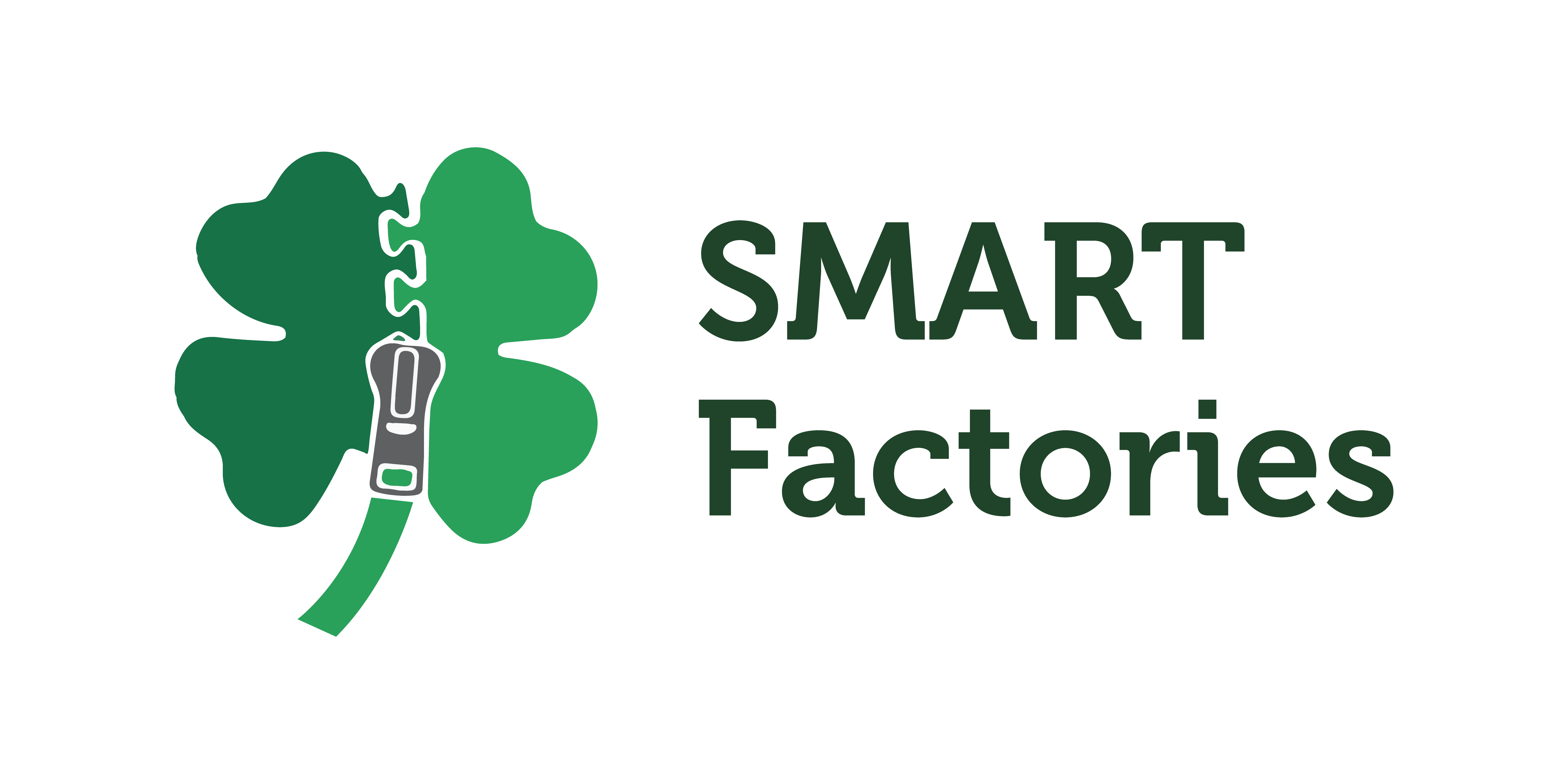Yangon, September 9, 2015
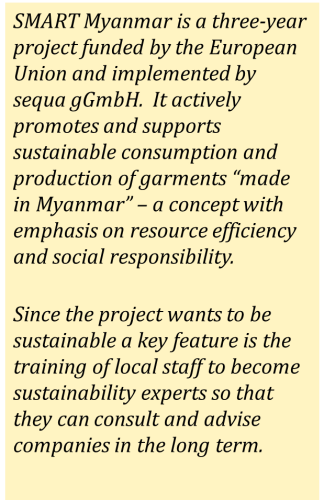 Have you ever heard about a job called “Sustainable Consumption & Production Consultant”? If not, you feel just the same as thirteen young Myanmar professionals who applied for such a training and job offer two years ago with SMART Myanmar – a project that aims to support the Myanmar garment manufacturers to become more competitive in the global market.
Have you ever heard about a job called “Sustainable Consumption & Production Consultant”? If not, you feel just the same as thirteen young Myanmar professionals who applied for such a training and job offer two years ago with SMART Myanmar – a project that aims to support the Myanmar garment manufacturers to become more competitive in the global market.
In July 2013 many Myanmar young professionals and fresh graduates were enticed by an ad that looked for applicants that wanted to become Sustainable Consumption & Production (SCP) Consultants. Although the job title did not tell them much they got interested in a job offer that included intensive trainings by local and international consultants and included key words such as environmental accountability and social compliance. The applicants came from different backgrounds, such as e.g. mechanical engineering, electrical engineering, sales & services, construction and even a broadcasting engineer applied. Their motivation varied, many were interested in a better carrier opportunity and international trainings, while others were specifically keen on some content related aspects such as manufacturing, productivity or environmental issues.
But remarkably, all of them were eager to support the development of their home country and wanted to commit to it. They saw this job offer as a good opportunity to contribute to the improvement of the Myanmar manufacturing industry while keeping environmental concerns and fair treatment of workers in mind.
End of July 2013 a group of 13 applicants was chosen and they embarked on their journey to become SCP consultants for the Myanmar manufacturing industry – with a focus on garment manufacturing, although none of them had experience in that industry sector. They signed up for the 2.5 months long full-time training that came with a trainee allowance which made it possible for them to fully concentrate on the training.
During this intensive training phase a variety of training topics was covered, mostly in theory classes, to build a knowledge base. International experts and the local sustainability component team leader conducted the trainings and the majority of topics were a totally new arena for everybody. They were introduced to energy and resource efficiency, total quality management, occupational health and safety, business planning and company audits, to name a few. The vast collection of topics was already a challenge but the major dare was that all trainings of the international consultants were conducted in English! As a supportive measure English language courses were included throughout the whole duration of the initial training phase, which helped the trainees a lot.
After the intensive training phase the trainees were offered a part- time working contract as SCP consultant with a continuous on-the-job training component. Now the focus shifted from mainly theoretical classes in the initial phase to more practical instructions. The trainings became more hands-on, factory visits with international consultants on different topics were conducted and the trainees were able to get more exposure by attending international workshops with topics such as “Social Dialogue” or “CSR panel discussion”.
For many of them the two-week internship program in one of the garment factories was an eye-opener. Min Mon Myat and Zar Chi Tun explained that “during the internship program we were able to experience the daily life in the factory and fully understand the whole production process and its challenges.” This knowledge helped them when they wrote their detailed internship report with improvement suggestions such as the introduction of a new position in the organizational chart but also later during other consultations at factory level.
In February 2014 the “Factories Improvement Program” of SMART Myanmar started; initially with 16 companies that attended in a series of group workshops all geared to initiate a change to a more sustainable production and to social compliance. The international implementation partners of the program were garment production experts from ESGE Textilwerk Maag GmbH & Co KG and social compliance experts from Systain Consulting. The SCP trainees joined all workshops and trainings conducted by the international experts and assisted them as part of their on-the-job training. Other seminars outside the factories improvement program complemented the training e.g. on Myanmar labor law or fire safety.
When in May 2014 the factories improvement program changed from theory to a series of intensive in-house consultancies joined by ten garment manufacturers, the responsibilities of the SCP teams increased. Under the guidance of the senior project manager of the SCP component, Ms Theeri Kay Thi, the SCP consultants assisted in the in-house consultancies of the international experts, made follow-ups on implementation measures, wrote reports and kept the documentation up-to date.
SCP consultants and SCP component senior project manager Ms Theeri Kay Thi (center) during the Social Compliance Academy workshop (January 2015)
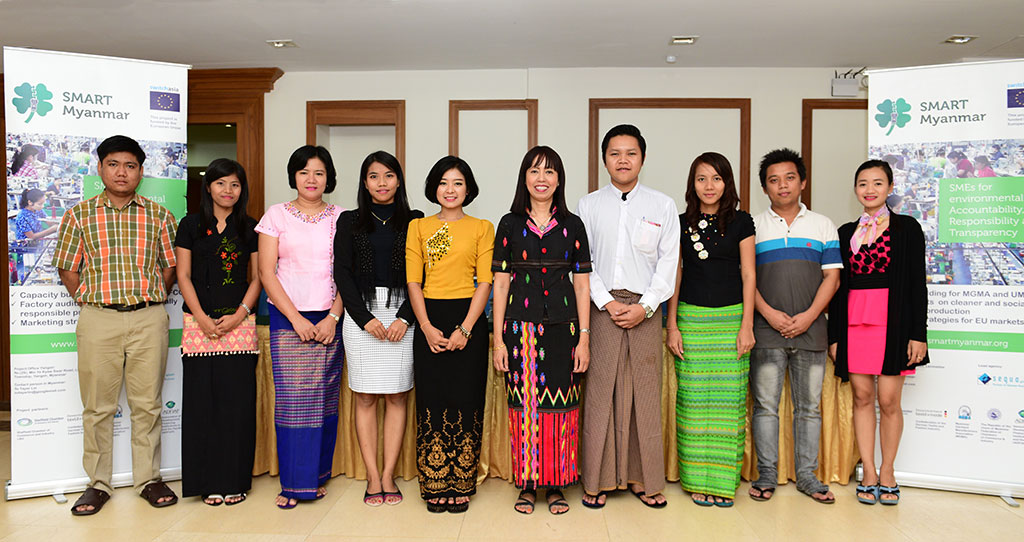
The learning effect was best during the practical on-site trainings and the in-house consultancies as stated by all SCP consultants. They mentioned that they learned the most by observing how the consultants adjusted to real-life situations in the factories and worked with the management and workers. In general they were very content with the trainings and workshops by the international consultants. Zeyar Oo said that “the consultants were open and patient and really wanted to share their knowledge.”
The more experienced they got, the more tasks they could fulfill. Around middle of 2015 the second training phase faded out and was replaced by the third phase where the SCP consultants work mostly independently but were supported by coaching through the senior SCP project manager and international consultants on specific topics. The shift from the on-the-job training to the coaching phase was incremental and took a few months.
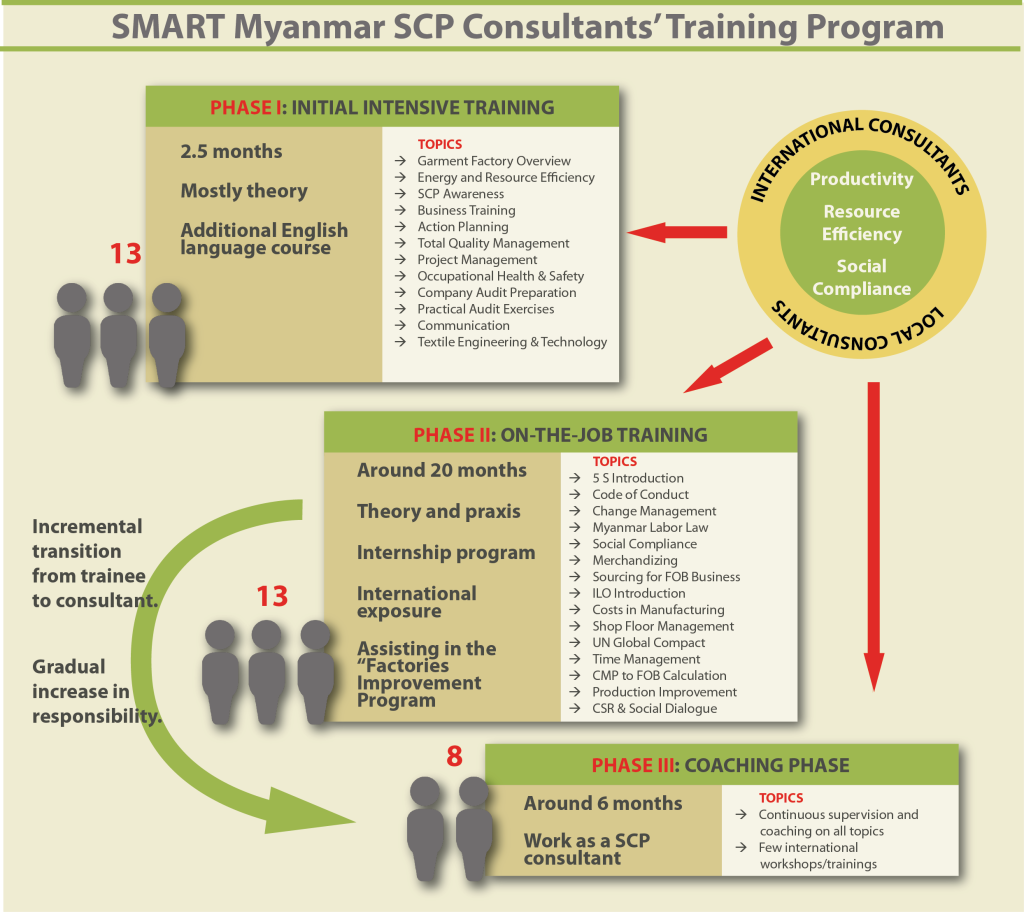
Today, the SCP consultants are able to cover most topics by themselves and feel confident enough to answer questions of managers and company owners. Some of them specialized e.g. in database management for production or in social compliance. They all observed that the acceptance of the SCP consultants, who are on average quite young, by the companies’ management increased a lot. May Mi Kyaw said that “in the beginning I felt shy and I did not know how to make suggestions and recommendations but now I can do it and my advice is accepted by factory managers.”
When the SMART Myanmar project goes into its second phase in 2016, the Myanmar garment industry can already avail of eight young sustainability consultants that can help them address issues on productivity, energy efficiency and social compliance. Moreover, eight young Myanmars are trained in a profession that they did not even know exists when they initially applied for it, driven by the wish to help their country on the path to sustainable development.
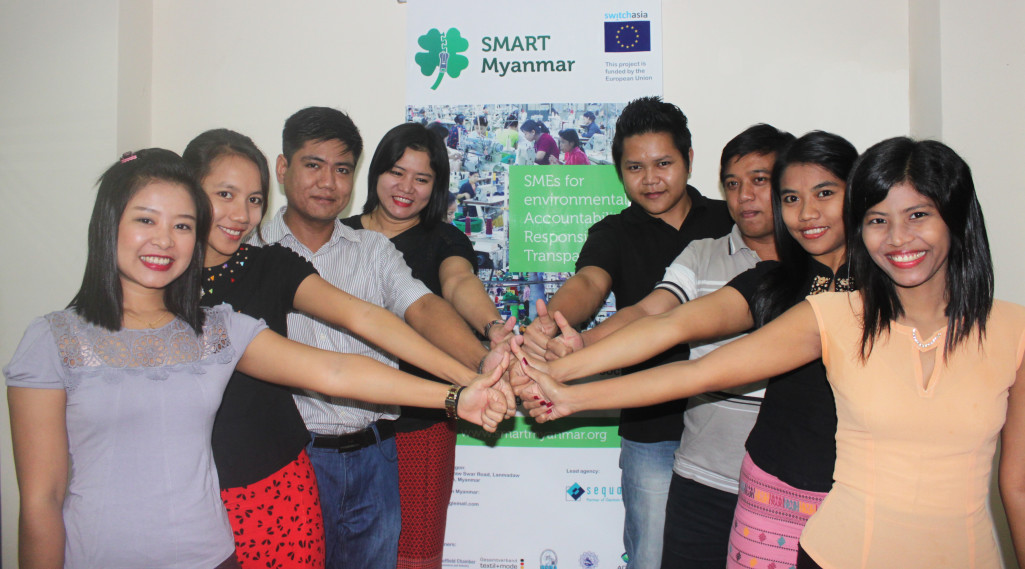 The eight SCP consultants of the coaching phase (September 2015)
The eight SCP consultants of the coaching phase (September 2015)
If you like further information about the topic please contact:
SMART Myanmar Office
Ms Theeri Kay Thi
Senior Project Manager (SCP)
UMFCCI (11th Floor), N0.29, Min Ye Kyaw Swar Street, Lanmadaw Township, Yangon, Myanmar
Phone: +95(9)5142642,
Email: [email protected]
Website: www.smartmyanmar.org
